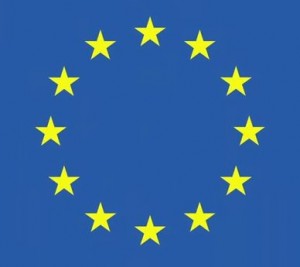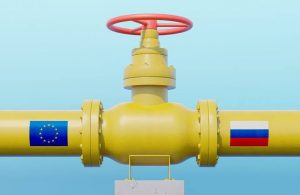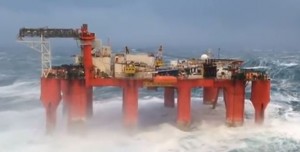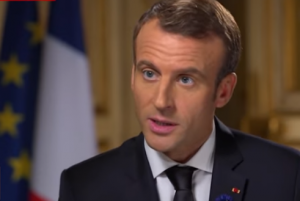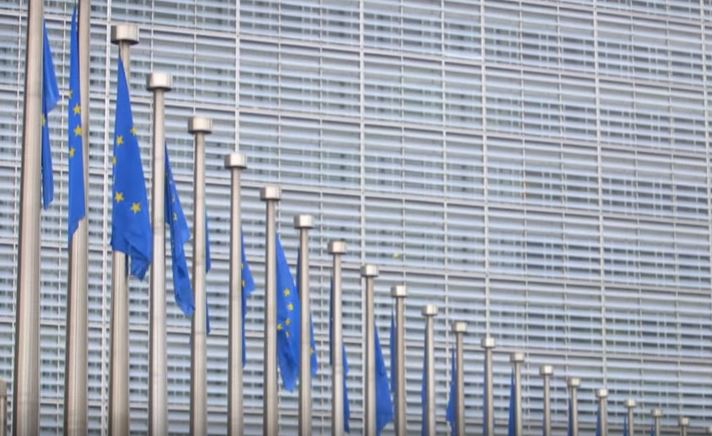
The Guardian / UK: The new French president, Emmanuel Macron, and German chancellor, Angela Merkel, have broken with previous statements by saying they would be prepared to look at changing EU treaties in order to allow a further integration of the eurozone.
Speaking at a joint press conference on Monday night during Macron’s inaugural visit to Berlin on his first full day in office, Merkel said: “From a German point of view, it is possible to change treaties if it makes sense in order to strengthen the eurozone.” She said she was personally prepared to make the case for such a change.
The comments will come as a painful blow to British politicians and diplomats such as David Cameron, whose calls for a reform to free movement were repeatedly rebuffed with the argument that treaty change under his proposed timetable was off the cards.
The German chancellor said she been “irked” ever since the signing of the Lisbon treaty by those who had written off treaty change: “The entire world is changing and we declare that we have exhausted ourselves once and that’s it for our entire lifetime,” she said.
Macron said “treaty change long used to be a French taboo”, but that this would change now that he was president. “For us there are no such taboos,” he said.
Macron, who swept into Berlin with a new German-speaking prime minister, Édouard Philippe, newly installed, reached for historic rhetoric in his speech, announcing that he would seek not just short-term results in tackling French unemployment, but nothing less than the “historic reconstruction of Europe and the eurozone”.
As the new French leader received military honours outside Merkel’s chancellory, crowds outside the gate chanted his name. Behind closed doors, he is likely to have been exposed to a more familiar mantra about balanced budgets, debt reduction and German taxpayers’ fears of being made to pay for bills left unpaid in other European states.
But Macron had the advantage of arriving in the German capital as a familiar face. Between 2012 and 2014, he was closely involved in Franco-German discussions over how to create deeper economic integration in the core of the eurozone – plans which later stalled because of then-president François Hollande’s domestic problems and more urgent diplomatic crises in eastern Ukraine. Macron will therefore be aware that making public demands from Berlin four months before a federal election is likely to backfire.
After his meeting with Merkel, Macron stressed that he was not in favour of eurobonds – loans underwritten by all members of the eurozone, which some conservative German politicians have described as a vision of “hell” for their voters. Instead, he stressed the need for investment. “I will reform not because Europe asks for it, but because France needs it,” he said. “I am not in favour of collectivising debts of the past. It leads to an irresponsible politics.”
Although Macron achieved a clear win over Marine Le Pen, the spectre of the Front National remains in the background, strengthening his hand as he hopes to open an historic window to revive some of these plans, such as an EU finance ministry, an EU budget for social issues and pan-European social insurance.
His first appointments looked aimed at oiling the rusty Franco-German tandem: the new prime minister studied for his A-Levels in Bonn and a former French ambassador in Berlin has been promoted to a close advisory role.
While Merkel has often cast a sceptical eye on young men who sweep into office with rhetorical bravado, German media report her admiration for the manner in which Macron gained the presidency.
Der Spiegel wrote that the German chancellor “respects the toughness with which he has climbed his way to the top” and sees more similarities between her and Macron’s approach to Russia than that of failed conservative candidate François Fillon, a more natural party ally of the German Christian Democrat.
She may also remember his praise for her open-border policy at the height of the refugee crisis, which Macron said “saved our collective dignity”. Merkel’s decisions in September 2015 has left the German chancellor more isolated and in need of allies in Europe than before.
Even Germany’s bull-headed finance minister, Wolfgang Schäuble, hinted over the weekend that his position on the new French president’s plans for deeper eurozone integration was not as intransigent as reputation has it.
Confronted with the suggestion that Germay should divert more of its budget surpluses to southern Europe, Schäuble told news weekly Der Spiegel there was a need for transfers between wealthier and poorer EU states: “A community cannot exist without the strong vouching for the weaker ones,” he said.
Schäuble, famed as a fiscal hardliner in debt negotiations with Greece, said he thought “a lot” of Macron’s call for the creation of a European finance minister role, adding that he himself had made a similar proposal in the past.
However, the German conservative added that such a role would be pointless unless the finance ministry had its own budget and the authority to enforce Europe-wide spending rules. “Such a wide-reaching change requires changes to the European treaties,” Schäuble said. “And there are not many who believe this is realistic at the moment.”
Politicians on the German centre left, especially foreign minister Sigmar Gabriel, are trying to use the momentum of Macron’s victory to revive many of the policy ideas originally developed in 2012 to 2014, when the new president was first an adviser and then economic minister in Hollande’s government.
In a policy paper called “Élysée 2.0”, presented in Berlin last week, Gabriel pleads for the revival of the idea of a financial transaction tax – originally conceived by the two governments in 2013 – boosted with a Europe-wide corporate income tax, as well as transforming the European stability mechanism into a European investment fund similar to the IMF.
The media may be harder to win over. In the German press, relief about Macron’s victory has been quickly replaced with scepticism about the new president’s reformist vision. “Expensive friend: Emmanuel Macron saves Europe and Germany is meant to pay” ran Der Spiegel’s cover line.
“How much is Macron going to cost us?,” asked Bild. “France isn’t ailing because of the euro, because of Europe or even Germany”, wrote the tabloid’s opinion writer Nikolaus Blome. “The opposite is true: the euro, Europe and Germany are ailing because France has been standing still for years”.

